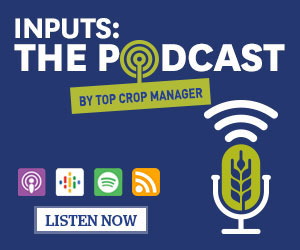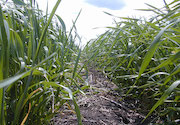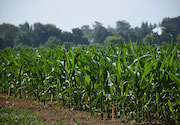| |
| |
 |
 |
| |
 |
|
@{mv_date_MMM d, yyyy}@ |
|
| |
 Growers are asked to report any European corn borer eggs, larvae or damage they find in any host crop via the early/mid-season (before July) and late season (July to pre-harvest) surveys.
» Read more...
Growers are asked to report any European corn borer eggs, larvae or damage they find in any host crop via the early/mid-season (before July) and late season (July to pre-harvest) surveys.
» Read more...
The strain of clubroot identified as pathotype 3A is able to overcome some first-generation sources of genetic resistance in commercial canola cultivars.
» Read more...
The new elevator will include 46,000 metric tonnes of storage capacity with a loop track rail design. The facility will feature high-speed receiving and load out, with a high-capacity grain cleaning system.
» Read more...
|
| |
 |
 |
| |
|
| |

Herbicide resistance is a major concern in Canada and, where it exists, waterhemp is one of the biggest concerns, given its ability to rapidly evolve resistance and current four-way resistant populations.
Peter Sikkema, professor of weed management at the University of Guelph, Ridgetown Campus, discusses the spread of multiple-resistant waterhemp in Ontario and how to manage it, chemically and with other tactics. Kim Brown-Livingston, crop specialist, weeds, with Manitoba Agriculture and Resource Development, emphasizes the importance of preventing further spread of this tier one noxious weed in the province.
» Listen now |
| |
|
| |
 In the biocontrol world, most people think of beneficial insects as those that attack insect pests. But there are other beneficial insects out there at ground level quietly munching their way through the weed seedbank. These seed predators, such as ground beetles and crickets, can substantially reduce the amount of weed seed going into the seedbank.
» Learn more
In the biocontrol world, most people think of beneficial insects as those that attack insect pests. But there are other beneficial insects out there at ground level quietly munching their way through the weed seedbank. These seed predators, such as ground beetles and crickets, can substantially reduce the amount of weed seed going into the seedbank.
» Learn more |
| |
 A new study from the University of Guelph looks at how management approaches can reduce N2O emissions at the provincial level, while considering trade-offs with other forms of N loss, such as leaching and ammonia volatilization. As study lead and University of Guelph professor, Claudia Wagner-Riddle, notes, N2O losses are hugely affected by interactions between the weather, management decisions and soil.
» Learn more
A new study from the University of Guelph looks at how management approaches can reduce N2O emissions at the provincial level, while considering trade-offs with other forms of N loss, such as leaching and ammonia volatilization. As study lead and University of Guelph professor, Claudia Wagner-Riddle, notes, N2O losses are hugely affected by interactions between the weather, management decisions and soil.
» Learn more |
| |
|
| |
Access the on-demand and recorded live sessions today!
» Read more
|
| |
| |








